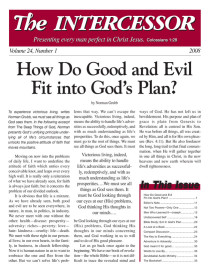
Book Review: The Spontaneous You
I first read The Spontaneous You in the 1970’s; it was my introduction to the transforming insights of Norman Grubb. As a fairly new Christian at that time, I had just started to attend a neighborhood Bible study. One day a lady quietly interjected comments that got my attention: things like “humans have no nature” and “our spirit-union with Jesus Christ.” Later, when I asked her more questions, she suggested I read Norman Grubb–any of his books. The Christian bookstore offered several titles, and I made my selection attracted by the word spontaneous. Reading The Spontaneous You was like a plunge to the ocean depths: I entered a new dimension that would eventually revolutionize my understanding of the Christian life, my relationship with Jesus Christ and people around me, and provide a full and complete answer to life.
The Spontaneous You is neither the earliest nor the most recent of Norman’s books. First published in 1966 (and now re-published in 2007 by Zerubbabel Press), it was one of the many books and pamphlets Norman wrote to “dig down into the foundations and examine the basis of human living, not as a theory but in workable experience.” As I reread The Spontaneous You, however, I find it as excellent and practical a diving platform into these depths today as it was years ago.
For those who met Norman Grubb personally, the chapter titles bring back flashes of his ease and wit in sharing: “God Never Does Things by Halves,” introduces the often missed second half of the atonement: our identification with Christ at His death–which effected the complete separation of the Satan-indwelt spirit from His body (and us in Him) and at His resurrection, the entrance of the Spirit into His body in an eternal spirit-union (and us in him). Understanding this second half of our salvation, Norman points out, is the foundation for the complete solution to Satan’s domination of the unsaved and harassment of the Christian.
In “That Clever God,” we see how God not only provided a complete provision to our enslavement to sin and Satan, but also how He conditioned us to want His solution, by giving us the Law to make us aware of our dire need for a Savior: “Law, then, is not God’s frown on us; it is the first form of his love .We must have the wrong way exposed to us which in our blindness we try to make is the right, before we are conditioned to desire or find the right.”
Having laid the foundation and provision for a complete solution to the problem of sin, Norman guides us forward, chapter after chapter, to the application of that solution to everyday life: “The Answer Completed,” “At Last–The Spontaneous You.” The book could end there, having a thorough and practical understanding of our reconciliation to God and union with Christ. Yet the answer is still not a total answer to life.
Norman spends the final third of the book taking us beyond ourselves–to God’s need for mature Sons through whom He can manifest of His nature of outpoured love–as priests and intercessors to the lost. With solid biblical references and personal anecdotes, Norman navigates us through depths into which few in our day have gone–exposing the mind and heart of God and His redemptive purposes in the trials and painful circumstances in which we find ourselves: a complete paradigm shift that changes the adversity in our lives into adventure.
Recently several folks discussing The Spontaneous You noted that for each of them this book is perhaps the most current of Norman’s books in application–addressing needs and circumstances very familiar to us today. For those of us “eager to find the really releasing answer to living free in their private prisons of frustrating circumstance,” The Spontaneous You provides a total answer and a practical guide for living the purposeful, spontaneous life for which we were created.





